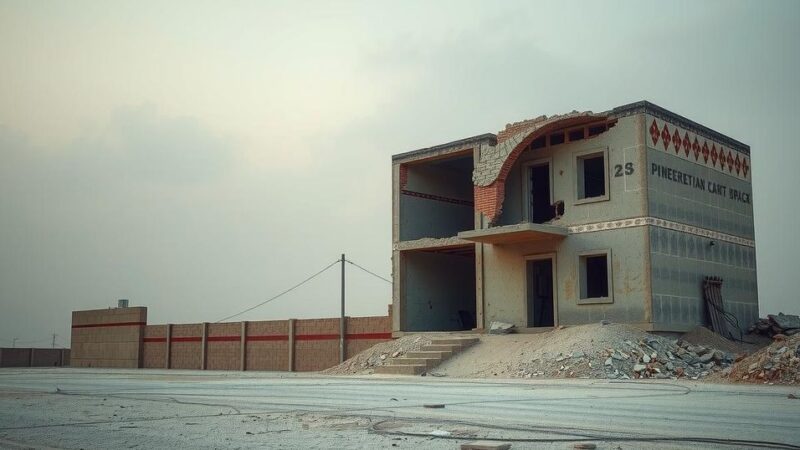Secretary of State Antony Blinken wrapped up a week of diplomatic discussions in London with key officials from the UAE, Lebanon, and Jordan, focusing on ending the Gaza conflict, supporting humanitarian efforts, and implementing UN Security Council Resolution 1701 to stabilize Lebanon. Blinken reiterated U.S. commitment to peace and urged for immediate diplomatic action to protect civilians.
United States Secretary of State Antony Blinken concluded a week focused on diplomatic engagement in the Middle East with discussions on Friday in London. His meetings included United Arab Emirates Foreign Minister Sheikh Abdullah bin Zayed Al Nahyan, Lebanese Caretaker Prime Minister Najib Mikati, and Jordanian Deputy Prime Minister and Minister of Foreign Affairs Ayman Safadi. During his dialogue with Foreign Minister Al Nahyan, Blinken addressed ongoing efforts to “end the war in Gaza and secure the release of all hostages” while also discussing the prospects of the “post-conflict period.” Furthermore, in his meeting with Prime Minister Mikati, Blinken reaffirmed the United States’ commitment to achieving a diplomatic resolution in Lebanon that adheres to United Nations Security Council Resolution 1701, which aims to facilitate the safe return of displaced individuals from both sides of the Israeli-Lebanese border. Blinken emphasized U.S. support for both the Lebanese government and its military institutions, while also expressing concern over civilian casualties and the dire humanitarian conditions impacting vulnerable populations. In discussions regarding Lebanon’s security, Blinken asserted that Iran and Hezbollah “must not stand in the way of Lebanon’s security and stability” and reiterated support for the United Nations Interim Force in Lebanon, at the same time stressing the need for secure conditions for their personnel. The Secretary noted the urgency of filling Lebanon’s presidential vacancy and fostering leadership that represents the people’s will. Before meeting with Safadi, Blinken acknowledged Jordan as an essential ally for the United States in the region, particularly in providing support to Palestinians in Gaza. He praised Jordan’s leadership role in humanitarian efforts. Blinken described the constructive conversations he had over the week regarding the urgent need to resolve the ongoing conflict in Gaza. In a prompt before their meeting, Safadi informed the media that the region stands on the brink of war and emphasized the necessity for Israel to cease its aggressive actions, which exacerbate tensions in Gaza and Lebanon. Safadi underscored that dialogue towards a “just and lasting peace that will guarantee the security of all” is imperative to prevent further humanitarian crises. The prime minister mirrored Blinken’s sentiments regarding the dire nature of the humanitarian situation and the need for the Lebanese government to fully implement Resolution 1701, which would mitigate the catastrophic loss of life in the region. Safadi called for a halt to the conflicts, asserting that diplomacy must take precedence to avert further deterioration of regional stability. In closing, Blinken reiterated the priority of pursuing a diplomatic solution, stating that protecting civilians, particularly the Lebanese Armed Forces, remains a significant aspect of these discussions. He expressed a strong desire to ensure that civilians are not caught in the crossfire as negotiations progress towards peace.
The article chronicles Secretary of State Antony Blinken’s recent diplomatic engagements focused on the Middle East. Highlighting his discussions with officials from Jordan, Lebanon, and the United Arab Emirates, the article underscores the urgency of addressing the ongoing conflicts, particularly in Gaza, and the strategic importance of implementing United Nations Security Council Resolution 1701 to foster peace and stability in the region. The backdrop of these discussions includes rising tensions and humanitarian crises, necessitating heightened diplomatic efforts.
In summary, Secretary Blinken’s diplomatic week emphasized the urgent need for resolution in the ongoing conflicts affecting the Middle East, particularly regarding Gaza and Lebanon. His discussions with key regional leaders centered on reinforcing humanitarian aid, implementing UN directives, and ensuring regional stability through cooperative diplomatic efforts. As tensions persist, the emphasis on diplomatic resolutions highlights the critical role the United States plays in facilitating peace in the region.
Original Source: www.jpost.com






